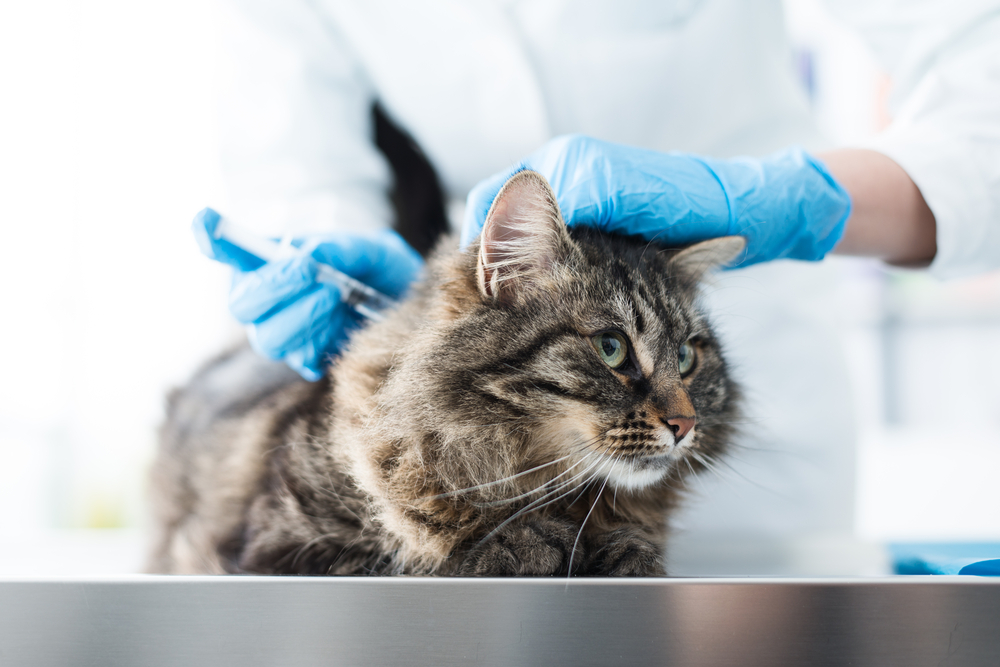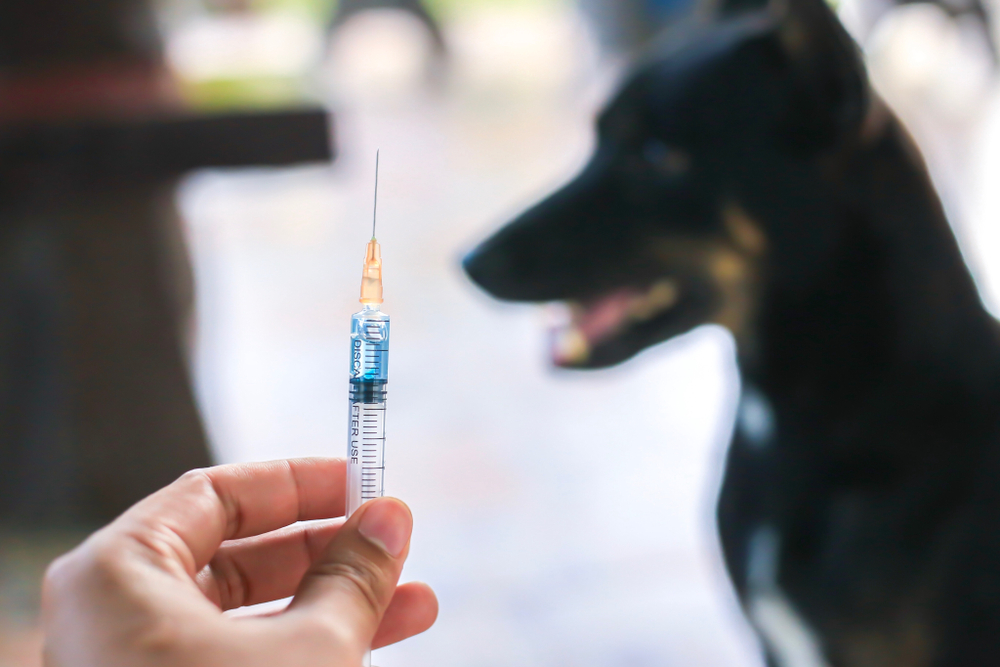Vaccines train your pet’s immune system to protect them against infectious agents, and they can lower your pet’s risk of becoming sick with many infectious diseases. Our Village Veterinary Hospital team wants to help by providing information about the diseases that pet vaccines help prevent.
Pet vaccines help prevent rabies
Rabies is considered a core vaccine for cats and dogs, and is required by law in Washington state. Important information about this deadly viral disease includes:
- Transmission — Rabies is carried by wildlife, such as bats, raccoons, skunks, and foxes, and is typically transmitted through an infected animal’s bite. Your infected pet can transmit the disease to you and your family.
- Signs — Signs include fever, excessive drooling, aggression, difficulty swallowing, incoordination, paralysis, and seizures, and can take weeks to months to manifest.
- Treatment — No treatment exists for rabies, and once signs occur, the disease is almost always fatal.
Dog core vaccines help prevent diseases
Core vaccines are those recommended for all pets, and dog core vaccines help prevent the following diseases:
- Parvovirus — Important information about this highly contagious viral disease includes:
- Transmission — Transmission typically occurs by contacting infected dogs and contaminated objects and surfaces.
- Signs — Signs include lethargy, fever, vomiting, and severe diarrhea, which is often bloody.
- Treatment — Treatment, which involves intensive care efforts to combat dehydration, control vomiting and diarrhea, and prevent secondary infections, must begin immediately.
- Canine distemper — Important information about this viral disease includes:
- Transmission — Transmission can occur by contacting an infected dog or contaminated objects or inhaling infectious respiratory droplets, or through the mother’s placenta.
- Signs — Signs include fever, ocular and nasal discharge, cough, lethargy, inappetence, and vomiting. In severe cases, the nervous system can be affected, causing signs including circling, head tilt, muscle twitching, and seizures.
- Treatment — Treatment involves supportive care and management to prevent secondary infections.
- Canine infectious hepatitis — Important information about this adenovirus includes:
- Transmission — Transmission occurs by contacting infected urine, nasal discharge, and eye secretions.
- Signs — In mild cases, signs include decreased appetite, depression, and respiratory signs, with some dogs also developing corneal opacity. In severe cases, which typically involve young puppies, signs can include vomiting, diarrhea, head and neck swelling, and jaundice.
- Treatment — Treatment involves supportive care, sign management, and secondary infection prevention.
Cat core vaccines help prevent diseases
Cat core vaccines help prevent the following diseases:
- Feline viral rhinotracheitis — Important information about this herpesvirus includes:
- Transmission — The virus is spread in an infected cat’s saliva, nasal discharge, and eye secretions.
- Signs — Signs include fever, sneezing, inflamed eyes, and excessive salivation.
- Treatment — Treatment involves managing the clinical signs and controlling secondary infections.
- Feline calicivirus — Important information about this highly contagious virus includes:
- Transmission — The virus is spread in an infected cat’s saliva, nasal discharge, and eye secretions.
- Signs — Signs include sneezing, nasal congestion, inflamed eyes, and nasal and ocular discharge, plus ulcers on the tongue, hard palate, gums, lips, or nose in some cats.
- Treatment — Treatment involves managing clinical signs and controlling secondary infections.
- Feline panleukopenia — Information about this feline parvovirus includes:
- Transmission — The virus is shed in an infected cat’s urine, feces, and nasal secretions, and also can be spread by fleas.
- Signs — Signs include depression, inappetence, fever, vomiting, severe diarrhea, and nasal discharge.
- Treatment — Treatment involves intensive supportive care to correct dehydration and prevent secondary infections.
- Feline leukemia virus — This vaccine is considered a core vaccine for kittens and outdoor cats. Important information about this viral disease includes:
- Transmission — Transmission typically occurs through an infected cat’s bite.
- Signs — Signs include inappetence, progressive weight loss, enlarged lymph nodes, persistent fever, chronic or recurrent infections, and persistent diarrhea.
- Treatment — Treatment involves managing signs and controlling secondary infections.
Dog non-core vaccines help prevent diseases
Non-core vaccines are those recommended based on a pet’s lifestyle. Dog non-core vaccines help prevent the following diseases:
- Lyme disease — Lyme disease is transmitted by ticks, and signs include swollen lymph nodes, fever, lethargy, and joint pain. Treatment typically involves a particular antibiotic class, but the disease can be difficult to eradicate.
- Leptospirosis — Leptospirosis is typically transmitted by swimming in or drinking urine-contaminated water. The disease usually responds to antibiotics.
- Parainfluenza — Parainfluenza is transmitted by contacting an infected dog or contaminated objects. Signs include coughing, fever, lethargy, and nasal discharge. Treatment involves supportive care.
- Bordetella — Bordetella bronchiseptica is transmitted by contacting an infected dog or contaminated objects. Signs include a loud, honking cough, sneezing, lethargy, nasal discharge, and fever. Treatment includes supportive care and sometimes prescription antibiotics.
- Canine influenza — Canine influenza is spread through respiratory secretions and contaminated objects. Signs include cough, fever, and nasal discharge. Treatment involves supportive care and managing secondary infections.
Cat non-core vaccines help prevent diseases

Cat non-core vaccines help prevent the following diseases:
- Feline chlamydiosis — Feline chlamydiosis is spread through direct contact with an infected cat. Signs include eye inflammation. Treatment involves oral and topical antibiotics.
- Bordetella — B. bronchiseptica is spread in the saliva and nasal secretions. Signs include sneezing, cough, nasal and ocular discharge, and fever. Treatment involves supportive care, and sometimes prescription antibiotics.
Keeping your pet’s vaccines up to date lowers their risk of catching these dangerous diseases. If you would like your pet vaccinated, contact our Village Veterinary Hospital, so we can ensure they are protected.



















Leave A Comment